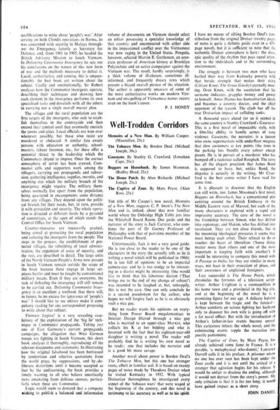Well-Trodden Corridors
The Home Patch. By Alun Richards. (Michael Joseph, 21s.) THE title of Mr Cooper's new novel, Memoirs of a New Man, suggests C. P. Snow's The New Men and is, indeed, about that now familiar world where the Oxbridge High Table juts into the Whitehall Board Room. Our guide and the narrator of the story is Jack Carteret, who com- bines the post of Dr Gurney Professor of Philosophy with that of part-time member of the National Power Board.
Unfortunately, Jack is not a very good guide. He is too close to the reader to be one of the characters in the story (he actually tells us he is writing a novel which will be published in 1966); he is too full of opinions to be an impartial camera-eye; and he is too stodgy to be interest- ing as a diarist might be interesting. One would like to think that his laborious diction (That brings me to the end of my change of subject') was intended to be laughed at, but, unhappily, this is not the case. One can only conclude he is a second pseudonym for the author, who hopes we will forgive Jack as he is so obviously such a nice guy.
But no reader wants his opinions on every- thing from Power Board megalomaniacs to Interior Design filtered through a nice guy who is married to an upper-class Marxist, who collects his K at her bidding and who is besotted with the fact that his eighteen-year-old daughter is writing a novel. The reader will probably find he is writing his own novel as he reads: one that includes the narrator and is a good bit more savage.
Another novel about power is Borden Deal's The Tobacco Men, but this one has stronger roots, albeit in familiar soil. It is based on twenty pages of notes made by Theodore Dreiser when he visited Kentucky in 1932. With typical Dreiserian thoroughness he investigated every aspect of the 'tobacco wars' that were waged at the beginning of the century, and this novel is testimony to his accuracy as well as to his spirit. I have no means of sifting Borden Deal's con- tribution from the original Dreiser (twenty pages of notes is quite a definite guide evert in a 429- page novel), but it is sufficient to note that the authentic Dreiser atmosphere is here: the slow, epic quality of the rhythm that pays equal atten- tion to the individuals and to the surrounding environment.
The struggle is between two men who have battled their way from Kentucky poverty with that heroic strength that- makes their story (Citizen Kane; The Great Gatsby) eternally mov- ing. Oren Knox, with the asceticism that his surname indicates, grapples money and power to himself. Amos Haines has humanitarian ideals and becomes a country doctor, and the chief opponent of the tycoon. The clash has all the true Dreiserian impact of colliding tanks.
A thousand years ahead (or so it seems) in the same country is Stanley Crawford's Gascoyne. This is a first novel of impeccable style, with a film-like ability to handle scenes of zany violence. Gascoyne, the narrator, is a tycoon who owns supermarkets with underfloor magnets that slow customers at key points (the trees in the parking lots floodlit every colour except green). He is in pursuit of a murderer who has bumped off a racketeer called Roughah. The story has all the elegant precision that James Bond is supposed to have, but, unlike Bond, the elegance is actually in the writing. Mr Craw- ford is the best comic writer I have read for some time.
It is pleasant to discover that the English can still write, too. James Mossman's first novel, Beggars on Horseback, has a conventional plot centring around the British Embassy in the Middle Eastern state of Marouf, but each of the many characters is explored with a rapid and impressive accuracy. The core of the novel is the friendship between Simon, who has drifted into espionage, and Hakim, who has drifted into revolution. They are not close friends, but in the mounting ideological pressures it seems they must betray each other. Their refusal to do so touches the heart of liberalism (`Some things matter more than others and one of the most important is keeping faith with another'). It would be interesting to compare this novel with A Passage to India, for they are similar in many ways, not least in• their evocation of place, and their awareness of anglicised foreigners.
Less successful is The Home Patch, which chronicles the fortunes of a television script- writer. Arthur Crighton is a cosmopolitan in his home town and 'a provincial in the big city, and at the beginning of the novel he is a promising figure for our age. A delicate balance is kept between the tragic and the farcical— Arthur comforts an actress fighting her husband only to discover his own wife is going off with a fat naval officer. But with the introduction of Arthur's father-in-law events become unreal. This caricature infects the whole novel, and the culminating events topple the narrative into puerile pantomime.
The Captive of Zour, by Marc Peyre, has already achieved some fame in France. It is a parable, 'a metaphysical who-dunnit,' Lawrence Durrell calls it in his preface. A prisoner whom no one has ever seen has been kept under the Zour castle and it is not until the arrival of a stranger that agitation begins for his release. It would be unfair to disclose the ending, although it would not detract from the story's power. My only criticism is that it is far too long; it would have gained impact as a short story.
JOHN DANIEL


































 Previous page
Previous page